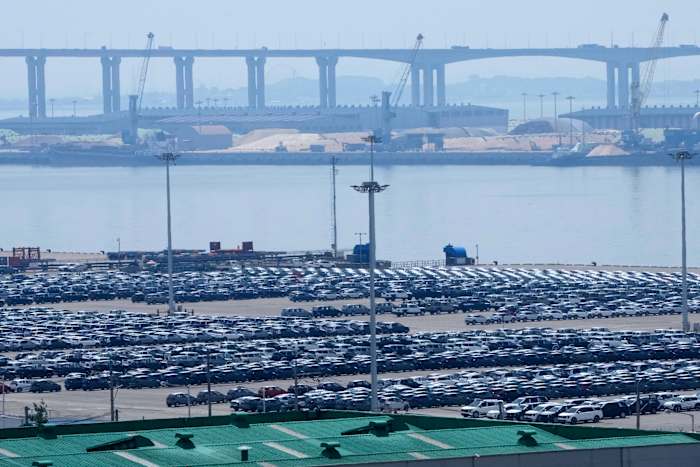Global Response to Trump’s Tariff Increases
BANGKOK – Recent tariff increases announced by U.S. President Donald Trump, reaching as high as 41% on imports from multiple countries, have elicited a variety of reactions globally. As some nations expressed relief over negotiated agreements, others voiced their disappointment after missing the August 1 deadline to finalize deals with the United States.
These revised tariffs are set to take effect on August 7, yet uncertainty looms regarding Trump’s future decisions, particularly concerning China, which holds a substantial trade surplus with the U.S. After failed negotiations earlier this week in Stockholm, the outlook remains uncertain. Trump also has yet to clarify whether he will extend the August 12 pause on steep import duties applicable to Chinese goods.
Market Reaction Appears Muted
In the wake of the announcement, financial markets reacted tepidly, with major indices in Asia declining. South Korea’s Kospi index fell nearly 4% after the U.S. tariff rate for the country was raised to 15%. Additionally, the U.S. dollar weakened against the Japanese yen, trading at over 150 yen for each dollar.
Discontent in Canada and Switzerland
Canadian Prime Minister Mark Carney expressed dissatisfaction with Trump’s decision to increase U.S. tariffs on Canadian goods from 25% to 35%. This change, effective immediately, also imposed a 40% import duty on products transshipped from unnamed countries. Trump cited insufficient cooperation in combating drug trafficking as a reason for the increase. He also criticized Canada’s support for recognizing a Palestinian state and expressed concerns over the trade deficit linked to U.S. oil purchases.
“Canada accounts for only 1% of U.S. fentanyl imports and has been working intensively to further reduce these volumes,” Carney stated.
While many Canadian exports are protected under the U.S.-Mexico-Canada Agreement, products like steel, lumber, aluminum, and automobiles still face elevated tariffs.
Switzerland faced similar turmoil, with Trump imposing a 39% tariff, up from the initially suggested 31%. The Swiss government released a statement expressing regret at the U.S. decision while emphasizing its desire for a negotiated resolution.
Ongoing Negotiations from New Zealand and Australia
New Zealand officials affirmed their commitment to lobbying Trump to reduce the new 15% tariff on their exports. Trade Minister Todd McClay commented,
“We don’t think this is a good thing. We don’t think it’s warranted.”
In 2024, New Zealand recorded a trade surplus of $1.1 billion with the U.S., per data from the U.S. Trade Representative.
On the other side, Australia continues to face a hefty 50% tariff on its steel and aluminum exports, a situation that has been in place since June. Australia’s Trade Minister Don Farrell noted that the overall 10% tariff on exports to the U.S. was a testament to the efficacy of their negotiations.
Responses from Japan and Taiwan
Japan’s Chief Cabinet Secretary, Yoshimasa Hayashi, cautiously welcomed Trump’s decision to set the tariff on Japanese products at 15%, commenting on the necessity of closely reviewing the details. He stated,
“The Japanese government will continue to urge the U.S. side to promptly implement measures to carry out the recent agreement, including reducing tariffs on automobiles and auto parts.”
In Taiwan, President Lai Ching-te expressed hope that final negotiations would lead to a further reduction in tariffs, which have been set at 20%, down from an originally proposed 32%. Lai emphasized Taiwan’s importance as a supplier of advanced semiconductors for various technologies.
“20% from the beginning has not been our goal, we hope that in further negotiations we will get a more beneficial and more reasonable tax rate,” he said.
Mixed Outcomes for Other Nations
Cambodia’s Deputy Prime Minister Sun Chanthol expressed gratitude after the tariff rate on Cambodian goods was set at 19%, a significant drop from the proposed 49%. The government will also levy zero tariffs on U.S. goods. Sun indicated that Cambodia plans to purchase 10 passenger aircraft from Boeing as part of their commitment to enhance trade relations.
Thailand also faces a 19% tariff, a reduction from 36% proposed earlier. Finance Minister Pichai Chunhavajira stated,
“The outcome of this negotiation signals that Thailand must accelerate its adaptation and move forward in building a stable and resilient economy.”
Furthermore, Bangladesh celebrated a new 20% tariff, significantly better than the initially threatened 35%. Khalilur Rahman, Bangladesh’s national security advisor, referred to it as positive news for the country’s apparel sector and emphasized the importance of maintaining global competitiveness.
“Protecting our apparel industry was a top priority, but we also focused our purchase commitments on U.S. agricultural products,” Rahman concluded.
Conclusion
The varying responses to Trump’s tariff changes indicate a complex global economic landscape as nations navigate the implications of these trade policies.






